First edition of Nerdnite Amsterdam
Boston, Berlin, Chicago, LA, Dublin, and now Amsterdam. An evening where nerds and non-nerds come together for nerdery of all sorts (mostly presentations and drinks). No lengthy colloquia, but passionate, bite-size orations about out-of-the-box topics that you didn’t know you should know about.
Featured speeches are
* 744 and 645: Can you juggle them? I can!
…
The world of juggling has experienced dramatic changes in the last forty years. It all started as part of a buffoonish circus act involving clowns, unicycles and splattered pie. In those days, juggling was no more than throwing around random objects in a predictable pattern while behaving foolishly. From that point on, more sophisticated forms of juggling emerged. One of them is the combination of juggling with music and dance, dubbed “The New Circus”. The other, more “nerdy” side of the new juggling is called “technical juggling”. It involves complicated patterns, combination of different tricks, and a precise realization of all the moves. In this talk, the science of juggling and its relation to mathematics will be introduced. Numbered sets and permutations will be juggled into a beautiful pattern. And of course, some examples will be demonstrated real-time with an increasing number of balls…
Bio: Balázs Pozsgay studied physics at the Eötvös University in Budapest, he also did his PhD there. Since November 2009 he is a postdoctoral researcher at the Institute for Theoretical Physics, UvA.
* On-the-job training for robots
Forget Gyro Gearloose’s Cleanup-Robot and Toothbrush-O-Matic: rigid, narrow-minded, single-purpose machines. The way forward is evolutionary robotics: a swarm of tiny, simple robots that form a symbiotic roborganism that can perform any given task. If a single robot fails, the swarm can pretty much carry on regardless. Also, the robots can reconfigure the organism to suit particular tasks and circumstances, something that large and complex individual robots would find impossible. In this talk, the peculiarities of these multi-purpose automatons are revealed. And, most importantly, how to teach the little rascals to behave.
Bio: Evert Haasdijk is a researcher at Gusz Eiben’s computational intelligence group at the Amsterdam Free University. Before that, he worked as a research consultant for Cap Gemini Innovation and as director of software development at KiQ Ltd.
In between and after, there will be drinks and music by The Benelux, ‘a vintage shock of tasteful noise, beats and resonating vocals’. English spoken.
Date: Thu 17th February, 20.00 hr
Location: CREA Muziekzaal
Admission: free
No reservations.
